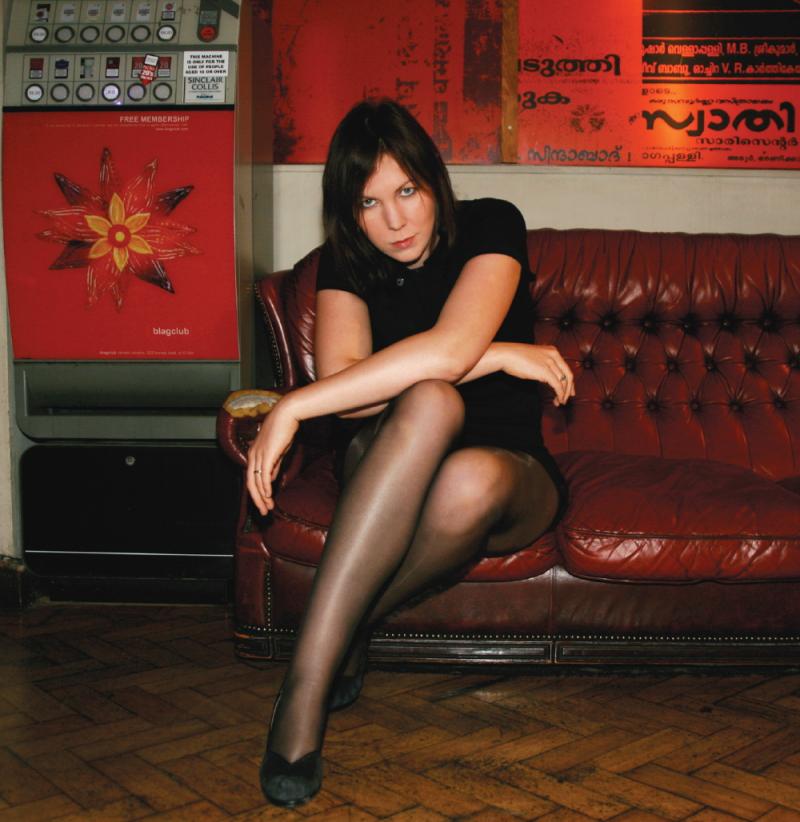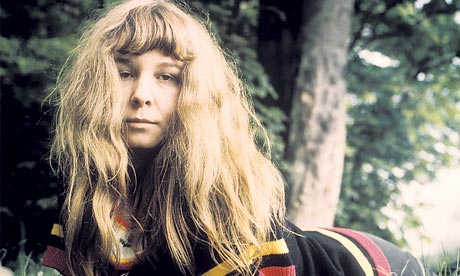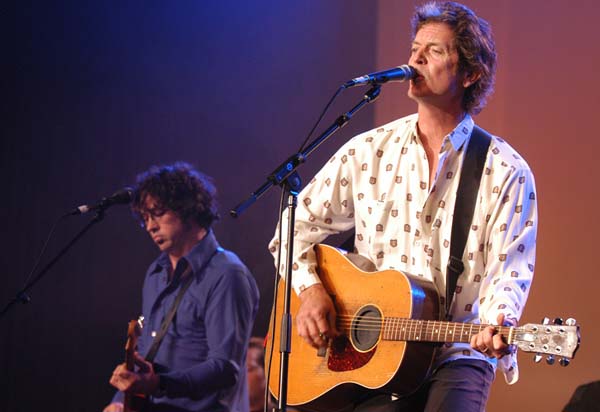Unfinished Business: Writing Songs With the Dead | reviews, news & interviews
Unfinished Business: Writing Songs With the Dead
Unfinished Business: Writing Songs With the Dead
Thea Gilmore and Rodney Crowell discuss their collaborations with Sandy Denny and Hank Williams

Creative time travel is very much in vogue. For musicians especially, it appears that death is not so much The End as an opportunity to extend the possibilities of the franchise. Early in 2012, American alt-country type Jay Farrar and My Morning Jacket’s Jim James will release New Multitudes, an (excellent) album of new songs based on some of the thousands of unrecorded lyrics left by Woody Guthrie after his death in 1967.
Already in 2011 Bob Dylan’s Egyptian label has released The Lost Notebooks of Hank Williams, featuring 12 previously unpublished Williams lyrics set to music by, among others, Dylan, Jack White, Norah Jones, Rodney Crowell and Lucinda Williams. English singer-songwriter Thea Gilmore, meanwhile, has just released Don’t Stop Singing, on which she sets to music 10 “lost” lyrics by the peerless Sandy Denny, most written shortly before her death in 1978. Fifteen years after the disappearance of Richey Edwards, the Manic Street Preachers returned to his work books for 2009’s Journal for Plague Lovers, while Guthrie's archive material has already spawned two albums - Mermaid Avenue Vols I and II - by Billy Bragg and Wilco.
At their best these projects feel like the happy result of a tear in the time-space continuum, an organic marriage between simpatico parties; at their least convincing they simply seem like an attempt to keep some version of the brand on the shelves long after the CEO has shuffled off. Usually it’s a combination of both.
 The estate of Sandy Denny (pictured right) has certainly seemed bee-busy of late, with last year’s monolithic box set followed by sundry other unearthed rarities. Was Gilmore ever concerned that she was being used as a means to puff up the profile and profits of an artist who hasn’t been making music for over three decades?
The estate of Sandy Denny (pictured right) has certainly seemed bee-busy of late, with last year’s monolithic box set followed by sundry other unearthed rarities. Was Gilmore ever concerned that she was being used as a means to puff up the profile and profits of an artist who hasn’t been making music for over three decades?
“It did bug me for a while, I wondered if I was doing the right thing,” she says. “All I could do was make sure my contribution was in the right spirit and done for the right reasons.” Through her email communication with the Denny estate she senses that their “impulse seemed very sincere”. There’s certainly no questioning Gilmore’s motivation: she has, rather amazingly, participated in the whole project for nothing. “I’ve never taken any money for this album and I won’t,” she says. “It wasn’t about anything other than the love of it.”
The practicalities of the project are fascinating. It began when the estate – Denny’s daughter Georgia, who was nine months old when she died, and Elizabeth Hurtt-Lucas, the widow of Denny’s late husband Trevor Lucas – sent Gilmore a booklet of her unpublished lyrics. Some, like the superb "Glistening Bay", were “obvious songs even on the page”, while others were more fragmentary. Gilmore also received photocopies of Denny’s original handwritten notes, which presented a dilemma. “There were lines crossed out, which was so interesting,” she says. “With some I thought, why did she cross that out? But no matter how good those lines were I had to respect that she’d made a conscious decision not to use them, so therefore I couldn’t either.”
She found herself surprised at the extent to which the words on the page suggested melody and music, making the writing process closer to the push-and-pull of a genuine artistic collaboration than she first imagined. “It’s easy to underestimate how much the lyrical tone influences the music,” she says. “I kind of felt where she was heading from the words, but it was still a constant tightrope walk between being respectful and perpetrating some act of musical sycophancy. It took a lot of consideration and a lot of musical dexterity. It certainly demanded more than my other stuff.”
The tale behind the Lost Notebooks of Hank Williams, meanwhile, is even longer and stranger. When Hank Williams died in the early hours of New Year’s Day, 1953, succumbing at the age of 29 to a combination of too much booze, too many pills and too many troubles, he left behind not just one of the most significant legacies of any songwriter, but also a brown leather briefcase filled with ideas for songs he was destined never to write.
When Dylan read the list he said, ‘Hey, why isn’t Pavarotti on this?’ I said, ‘Bob, he’s not a songwriter!'
Scrawled into four bound notebooks, these lost songs remained in the possession of his publisher, Acuff-Rose, for decades. “People who loved and adored Hank Williams always knew about them, but not a lot of other people did,” says Mary Martin, the veteran Nashville A&R exec who curated the record. When Acuff-Rose was bought by Sony Music Publishing in 2002 the unreleased Hank material went with it, and a plan started to emerge to assemble a record based on the best of the notebooks. “My God, what an honour that was,” says Martin. “We took a really good look at all the lyrics from the four notebooks, and decided which songs had the best potential. Some were maybe only about two stanzas, and some were more well formed.”
The initial idea was for one person to record all 12 of the songs. And who better than Bob Dylan? In his memoir, Chronicles Vol 1, Dylan recalled that when he first heard Williams, “The sound of his voice went through me like an electric rod." He and Martin are also friends. Dylan duly went away with the notebooks and set to work, but 18 months later returned empty-handed. “He said, ‘I can’t do this,’” says Martin. “So his manager Jeff Rosen suggested it could be a compilation record, with Dylan doing one song.”
In the end he contributed “The Love that Faded”, a suitably weathered waltz. The next question was determining who else should be involved. Suggestions ranged from Eminem to U2 to Dylan’s personal favourite, Pavarotti, none of whom made the cut for various reasons. Martin: “When Dylan read the list he said, ‘Hey, why isn’t Pavarotti on this?’ I said, ‘Bob, he’s not a songwriter!’ I had to say that several times...”
One of the decisive factors was that Martin wanted everyone involved to have a sense of kinship with Hank Williams and his music. In the end it was agreed that each of the participants had to be songwriters who understood the import of putting music to these words. “The only criterion was that they may have been honoured to have been asked,” says Martin. “I really love the affection everyone put into it.”
 Each artist was sent 27 lyrics and was asked to choose one to add music to and record. “It was such a heady idea, this over-the-top romantic notion that we were collaborating with Hank Williams,” says Rodney Crowell (pictured left), who recorded the stinging “I Hope You Shed a Million Tears” with Vince Gill. “That’s a very exalted place to be. I once wrote a song posthumously with Roy Orbison, but with Hank Williams the sense of history was even stronger, because it’s the music of my childhood. I must admit I’ve said it a couple of times, ‘Hey man, I’ve written a song with Hank Williams!’”
Each artist was sent 27 lyrics and was asked to choose one to add music to and record. “It was such a heady idea, this over-the-top romantic notion that we were collaborating with Hank Williams,” says Rodney Crowell (pictured left), who recorded the stinging “I Hope You Shed a Million Tears” with Vince Gill. “That’s a very exalted place to be. I once wrote a song posthumously with Roy Orbison, but with Hank Williams the sense of history was even stronger, because it’s the music of my childhood. I must admit I’ve said it a couple of times, ‘Hey man, I’ve written a song with Hank Williams!’”
Sometimes only the tiniest spark was needed to ignite the song. Crowell and Gill based their twilit recitation on just two lines that jumped out from the Xeroxed pages of Williams’s old notebooks. “I just saw ‘I hope you shed a million tears/ I hope you suffer too’ and thought, wow, that’s good,” says Crowell. “Pretty bitter! And that’s what we worked from. We weren’t looking for a lot of words, just enough to hang it on.” To add to the sense of historical import, Crowell heard that Williams’s steel guitar player, Don Helms, was still around and asked him to play on the session. He passed away shortly afterwards.
There were blood ties, too. “Blue is My Heart” was co-written and recorded by Williams’s granddaughter Holly Williams. “It was actually only eight lines when I first got it,” she says. “Bob Dylan and Mary Martin gave me all the lyrics but this song spoke to me unlike any other in the stack. I wrote two more verses and added a bridge, I’m hoping you can’t tell where Hank’s lyrics end and mine begin! It was such a beautiful lyric, I felt connected to it immediately when I picked up my guitar and tried to write to it.”
Ten years from drawing board to release, the album has been a labour of love for all involved, as has Don't Stop Singing for Gilmore. Arguably both works could have benefited from the occasional curveball; they are highly respectful of Williams and Denny, to the point of being over-cautious, but then a certain amount of second guessing comes with the territory when you’re dealing with the dead. “The word that I’m high on is legacy,” says Martin. In 2011, in more ways than one, the past has never been more alive.
Watch Thea Gilmore perform "Don't Stop Singing"
Buy
Explore topics
Share this article
The future of Arts Journalism
You can stop theartsdesk.com closing!
We urgently need financing to survive. Our fundraising drive has thus far raised £49,000 but we need to reach £100,000 or we will be forced to close. Please contribute here: https://gofund.me/c3f6033d
And if you can forward this information to anyone who might assist, we’d be grateful.

Subscribe to theartsdesk.com
Thank you for continuing to read our work on theartsdesk.com. For unlimited access to every article in its entirety, including our archive of more than 15,000 pieces, we're asking for £5 per month or £40 per year. We feel it's a very good deal, and hope you do too.
To take a subscription now simply click here.
And if you're looking for that extra gift for a friend or family member, why not treat them to a theartsdesk.com gift subscription?
more New music
 Cat Burns finds 'How to Be Human' but maybe not her own sound
A charming and distinctive voice stifled by generic production
Cat Burns finds 'How to Be Human' but maybe not her own sound
A charming and distinctive voice stifled by generic production
 Todd Rundgren, London Palladium review - bold, soul-inclined makeover charms and enthrals
The wizard confirms why he is a true star
Todd Rundgren, London Palladium review - bold, soul-inclined makeover charms and enthrals
The wizard confirms why he is a true star
 It’s back to the beginning for the latest Dylan Bootleg
Eight CDs encompass Dylan’s earliest recordings up to his first major-league concert
It’s back to the beginning for the latest Dylan Bootleg
Eight CDs encompass Dylan’s earliest recordings up to his first major-league concert
 Ireland's Hilary Woods casts a hypnotic spell with 'Night CRIÚ'
The former bassist of the grunge-leaning trio JJ72 embraces the spectral
Ireland's Hilary Woods casts a hypnotic spell with 'Night CRIÚ'
The former bassist of the grunge-leaning trio JJ72 embraces the spectral
 Lily Allen's 'West End Girl' offers a bloody, broken view into the wreckage of her marriage
Singer's return after seven years away from music is autofiction in the brutally raw
Lily Allen's 'West End Girl' offers a bloody, broken view into the wreckage of her marriage
Singer's return after seven years away from music is autofiction in the brutally raw
 Music Reissues Weekly: Joe Meek - A Curious Mind
How the maverick Sixties producer’s preoccupations influenced his creations
Music Reissues Weekly: Joe Meek - A Curious Mind
How the maverick Sixties producer’s preoccupations influenced his creations
 Pop Will Eat Itself, O2 Institute, Birmingham review - Poppies are back on patrol
PWEI hit home turf and blow the place up
Pop Will Eat Itself, O2 Institute, Birmingham review - Poppies are back on patrol
PWEI hit home turf and blow the place up
 'Fevereaten' sees gothic punk-metallers Witch Fever revel in atmospheric paganist raging
Second album from heavy-riffing quartet expands sonically on their debut
'Fevereaten' sees gothic punk-metallers Witch Fever revel in atmospheric paganist raging
Second album from heavy-riffing quartet expands sonically on their debut
 theartsdesk Q&A: Soft Cell
Upon the untimely passing of Dave Ball we revisit our September 2018 Soft Cell interview
theartsdesk Q&A: Soft Cell
Upon the untimely passing of Dave Ball we revisit our September 2018 Soft Cell interview
 Demi Lovato's ninth album, 'It's Not That Deep', goes for a frolic on the dancefloor
US pop icon's latest is full of unpretentious pop-club bangers
Demi Lovato's ninth album, 'It's Not That Deep', goes for a frolic on the dancefloor
US pop icon's latest is full of unpretentious pop-club bangers
 Yazmin Lacey confirms her place in a vital soul movement with 'Teal Dreams'
Intimacy and rich poetry on UK soul star's second LP
Yazmin Lacey confirms her place in a vital soul movement with 'Teal Dreams'
Intimacy and rich poetry on UK soul star's second LP
 Solar Eyes, Hare & Hounds, Birmingham review - local lads lay down some new tunes for a home crowd
Psychedelic indie dance music marinated in swirling dry ice
Solar Eyes, Hare & Hounds, Birmingham review - local lads lay down some new tunes for a home crowd
Psychedelic indie dance music marinated in swirling dry ice

Add comment